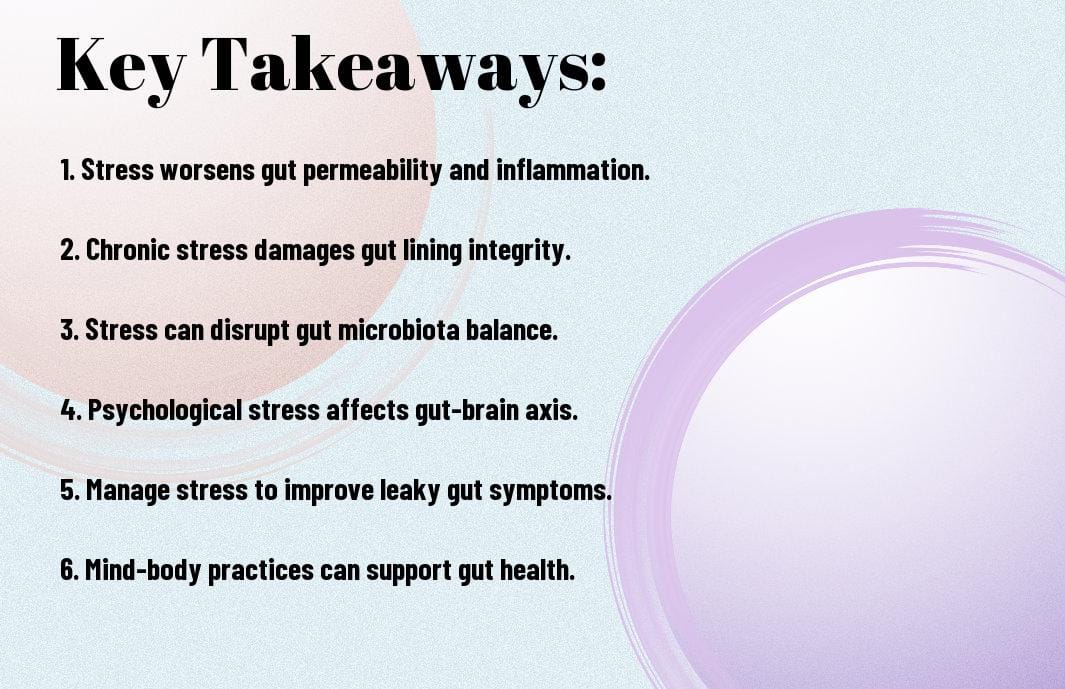You may not realize it, but the link between stress and gut health is powerful. Chronic stress can have a significant impact on the health of your gut, leading to conditions like leaky gut syndrome. Understanding how stress affects the gut can help you take proactive steps to improve your overall health. To investigate deeper into this connection between stress and leaky gut, check out this detailed article on Leaky Gut and Stress: Getting to the Root Cause of Chronic ….

To understand leaky gut syndrome, it is necessary to first grasp the concept of the gastrointestinal barrier. This barrier plays a vital role in the body, acting as a protective layer that regulates the passage of nutrients and substances, while preventing harmful agents from entering the bloodstream.
One of the key factors in the development of leaky gut syndrome is the deterioration of tight junctions in the intestinal lining. These junctions are responsible for controlling the permeability of the intestines, and when they become compromised, undigested food particles, toxins, and bacteria can leak into the bloodstream, triggering an immune response.
Another important aspect in the pathogenesis of leaky gut syndrome is chronic inflammation. When the intestinal barrier is compromised, it can lead to a cascade of inflammatory reactions in the body, further exacerbating the permeability of the gut and creating a cycle of inflammation that perpetuates the condition.
Any form of stress, whether it be physical, mental, or emotional, can have a direct impact on gut health. Chronic stress can lead to increased gut permeability, commonly known as leaky gut syndrome. When under stress, the body produces higher levels of cortisol, which can weaken the intestinal barrier, allowing toxins, undigested food particles, and harmful bacteria to pass through into the bloodstream.
Any imbalance in stress hormones, such as cortisol and adrenaline, can disrupt the delicate balance of the gut microbiota and contribute to digestive issues like bloating, gas, and inflammation. These stress hormones can also impair the communication between the brain and the gut, leading to a dysregulated response to food, causing further damage to the intestinal lining.
Permeability: Stress-induced changes in gut permeability can create a vicious cycle where increased intestinal permeability leads to more stress on the body, further exacerbating leaky gut syndrome. This can trigger immune responses, inflammation, and a host of digestive issues, ultimately impacting overall health and wellbeing.
All individuals experience stress on a daily basis, but chronic stress can be particularly detrimental for those with leaky gut syndrome. An effective approach to manage stress and support gut health is to incorporate lifestyle changes that promote relaxation and stress reduction. Activities such as yoga, meditation, deep breathing exercises, or regular physical exercise can help lower stress levels and improve overall well-being.
Leaky gut syndrome can greatly benefit from a diet that focuses on nurturing gut health. Foods rich in fiber, such as fruits, vegetables, whole grains, and legumes, can support the growth of beneficial gut bacteria and improve digestive function. Probiotic-rich foods like yogurt, kefir, sauerkraut, and kimchi can also help restore the balance of gut microflora, promoting a healthy gut lining and reducing inflammation.
Avoiding processed foods, added sugars, and artificial additives is crucial for those with leaky gut syndrome, as these can exacerbate intestinal permeability and inflammation. Opting for whole, nutrient-dense foods can help heal and repair the gut lining, ultimately reducing symptoms associated with leaky gut syndrome.
Taking this into account, it is clear that stress can have a significant impact on leaky gut syndrome. The connection between the two is complex and involves various physiological and psychological factors. Stress not only worsens the symptoms of leaky gut but can also contribute to the development of this condition. Therefore, managing stress levels is crucial in the prevention and treatment of leaky gut syndrome. By adopting stress-reducing techniques such as mindfulness, exercise, and therapy, individuals can help improve their gut health and overall well-being.
This post contains affiliate links. I will earn a commission if you buy through my link.
You may not realize it, but the link between stress and gut health is powerful. Chronic stress can have a significant impact on the health of your gut, leading to conditions like leaky gut syndrome. Understanding how stress affects the gut can help you take proactive steps to improve your overall health. To investigate deeper into this connection between stress and leaky gut, check out this detailed article on Leaky Gut and Stress: Getting to the Root Cause of Chronic ….

To understand leaky gut syndrome, it is necessary to first grasp the concept of the gastrointestinal barrier. This barrier plays a vital role in the body, acting as a protective layer that regulates the passage of nutrients and substances, while preventing harmful agents from entering the bloodstream.
One of the key factors in the development of leaky gut syndrome is the deterioration of tight junctions in the intestinal lining. These junctions are responsible for controlling the permeability of the intestines, and when they become compromised, undigested food particles, toxins, and bacteria can leak into the bloodstream, triggering an immune response.
Another important aspect in the pathogenesis of leaky gut syndrome is chronic inflammation. When the intestinal barrier is compromised, it can lead to a cascade of inflammatory reactions in the body, further exacerbating the permeability of the gut and creating a cycle of inflammation that perpetuates the condition.
Any form of stress, whether it be physical, mental, or emotional, can have a direct impact on gut health. Chronic stress can lead to increased gut permeability, commonly known as leaky gut syndrome. When under stress, the body produces higher levels of cortisol, which can weaken the intestinal barrier, allowing toxins, undigested food particles, and harmful bacteria to pass through into the bloodstream.
Any imbalance in stress hormones, such as cortisol and adrenaline, can disrupt the delicate balance of the gut microbiota and contribute to digestive issues like bloating, gas, and inflammation. These stress hormones can also impair the communication between the brain and the gut, leading to a dysregulated response to food, causing further damage to the intestinal lining.
Permeability: Stress-induced changes in gut permeability can create a vicious cycle where increased intestinal permeability leads to more stress on the body, further exacerbating leaky gut syndrome. This can trigger immune responses, inflammation, and a host of digestive issues, ultimately impacting overall health and wellbeing.
All individuals experience stress on a daily basis, but chronic stress can be particularly detrimental for those with leaky gut syndrome. An effective approach to manage stress and support gut health is to incorporate lifestyle changes that promote relaxation and stress reduction. Activities such as yoga, meditation, deep breathing exercises, or regular physical exercise can help lower stress levels and improve overall well-being.
Leaky gut syndrome can greatly benefit from a diet that focuses on nurturing gut health. Foods rich in fiber, such as fruits, vegetables, whole grains, and legumes, can support the growth of beneficial gut bacteria and improve digestive function. Probiotic-rich foods like yogurt, kefir, sauerkraut, and kimchi can also help restore the balance of gut microflora, promoting a healthy gut lining and reducing inflammation.
Avoiding processed foods, added sugars, and artificial additives is crucial for those with leaky gut syndrome, as these can exacerbate intestinal permeability and inflammation. Opting for whole, nutrient-dense foods can help heal and repair the gut lining, ultimately reducing symptoms associated with leaky gut syndrome.
Taking this into account, it is clear that stress can have a significant impact on leaky gut syndrome. The connection between the two is complex and involves various physiological and psychological factors. Stress not only worsens the symptoms of leaky gut but can also contribute to the development of this condition. Therefore, managing stress levels is crucial in the prevention and treatment of leaky gut syndrome. By adopting stress-reducing techniques such as mindfulness, exercise, and therapy, individuals can help improve their gut health and overall well-being.
This post contains affiliate links. I will earn a commission if you buy through my link.
